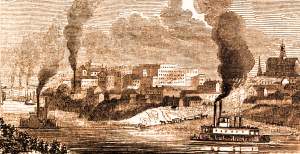Record Data
Source citation
"The President's Veto," Daily Union and American (Nashville, TN), March 28, 1866, p.2.
Type
Newspaper
Date Certainty
Exact
Transcriber
John Osborne, Dickinson College
Transcription date
Transcription
The following text is presented here in complete form, as it originally appeared in print. Spelling and typographical errors have been preserved as in the original.
THE PRESIDENT"S VETO
The President has vetoed what is known as the "Civil Rights" bill - a gross misnomer, for its effect was to destroy civil liberty, and convert the Federal government into a despotism. Its practical operation would abolish State judicature, and prostrate every man's civil and social rights at the feet of the Federal judiciary. It would place the negro on an equality with the white man, nay, give him superiority, for it would enable him to plead "color" and "custom" in every case which might arise, and every one infringing either would be 'amenable to the penalties prescribed for offenses against this law. It authorizes the Government to appoint an army of "Commissioners" to pervade every State, and spy out causes for action. In fact, it is a system of searching and sweeping espionage over the whole range of social and, civil conduct of the citizen. It is in conflict with every principle of civil liberty, and therefore generally and specially in violation of the Constitution.
The country will thank its noble Chief Executive for this interposition against the encroachments of Radical tyranny. It is an historic act, and will redound to his honor as long as liberty has a votary. The National Intelligencer of the 24th contains a lengthy editorial which is said to embody the President's views on the subject: The following is a summary of the article:
"This is a bill to abolish the States of the Union. To effect such an object but two conditions are requisite;- first, that doubtful federal powers should be used ; and second, that the statute should be efficiently executed.
"1st. It abolishes the State jurisdiction. This is so, because it makes it a high misdemeanor for any person to deprive anynative inhabitant of any right secured by
this act.
"2d. It establishes negro superiority. If, from any cause, the necessary police regulations of a State in its purely local and domestic concerns, should operate to recognize a distinction of color or race, however indirectly, this law may be worked successfully
to resist it with the army and navy of the United States. Negroes could be buyers of church pews in spite of the congregation,the court, people, and the whole State itself, and no landlord would dare to deny them all the privileges of the hotel.
"3d. The proposed statute as a whole, is grossly unconstitutional.
"4th. There is a class of objections, even more serious because more in consonance with the revolutionary designs of the contrivers of the bill. It authorizes the President to appoint spies and informers, absolutely without limit of number, officers whom he may specially empower. Thus we have at a glance a scheme, the most imperfect, contrived by wicked men for provoking that extension of military power, which would lift it into a gigantic and all pervading despotism, before which the liberties of the people would go down forever.
"But, say they, the power is in the President, and if the despotism comes, it will be through him. This brings us to the most important practical point of all. He could not execute this law, for he would not betray the people. They know he could not. They therefore hope to pass it over his veto; and when he refuses, to provoke universal insurrection, to be incited by the monstrous tyranny to which they invite him. Knowing he cannot accept, they will attempt toimpeach and remove him. The sovereign people have given the President a good support heretofore. We tell them the danger is not over. We counsel again meetings of the people, to rebuke, by their mighty force of authority, the new danger."


